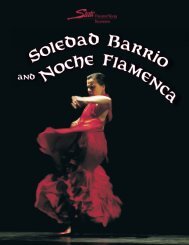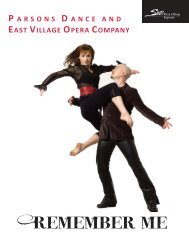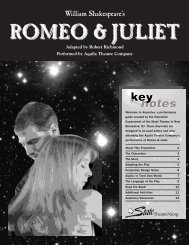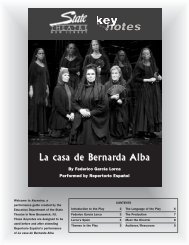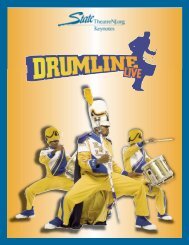Hamburg Symphony Orchestra - State Theatre
Hamburg Symphony Orchestra - State Theatre
Hamburg Symphony Orchestra - State Theatre
Create successful ePaper yourself
Turn your PDF publications into a flip-book with our unique Google optimized e-Paper software.
Decoding the Program Page<br />
11<br />
The program book (or playbill) contains helpful information about the performance. It lists the pieces the orchestra will play<br />
in the order they will play them. It tells you the name of each piece, the name of the composer, and the movement headings.<br />
If you’re not familiar with a piece, the program will help you keep track of what’s going on and know when the piece is<br />
finished. The program page for the Philharmonic of Poland looks like this:<br />
A MOVEMENT is a section<br />
within a musical piece, like a<br />
chapter in a book. Individual<br />
movements are usually<br />
referred to by the tempo<br />
marking that the composer<br />
has written at the beginning<br />
of the section. During the<br />
concert, there is usually a<br />
brief pause between<br />
movements, during which the<br />
audience should remain silent.<br />
Today’s concert etiquette<br />
dictates that you hold your<br />
applause until the entire piece<br />
is finished.<br />
OPUS NUMBER<br />
(among all of Brahms’<br />
published works)<br />
There are several ways that<br />
works of classical music can<br />
be identified. The system is<br />
not consistent from one<br />
composer to another.<br />
COMPOSER<br />
SOLOIST<br />
• NUMBER - where the piece<br />
falls in the catalogue of the<br />
composer’s works for a<br />
specific musical form (such<br />
as the Ninth <strong>Symphony</strong> or<br />
the Bassoon Concerto No.<br />
2).<br />
• OPUS NUMBER - where<br />
the piece falls in the entire<br />
catalogue of the composer’s<br />
works, in the order they<br />
were published. The lower<br />
the number, the earlier it<br />
was published (but not<br />
necessarily when it was<br />
written). Opus is a Latin<br />
word meaning “work.”<br />
FUNDING CREDITS<br />
Many arts institutions<br />
(including the <strong>State</strong><br />
<strong>Theatre</strong>) are not-for-profit<br />
organizations;<br />
acknowledging donors<br />
and sponsors is an<br />
important part of staying<br />
in business.<br />
what KEY the<br />
music starts in



